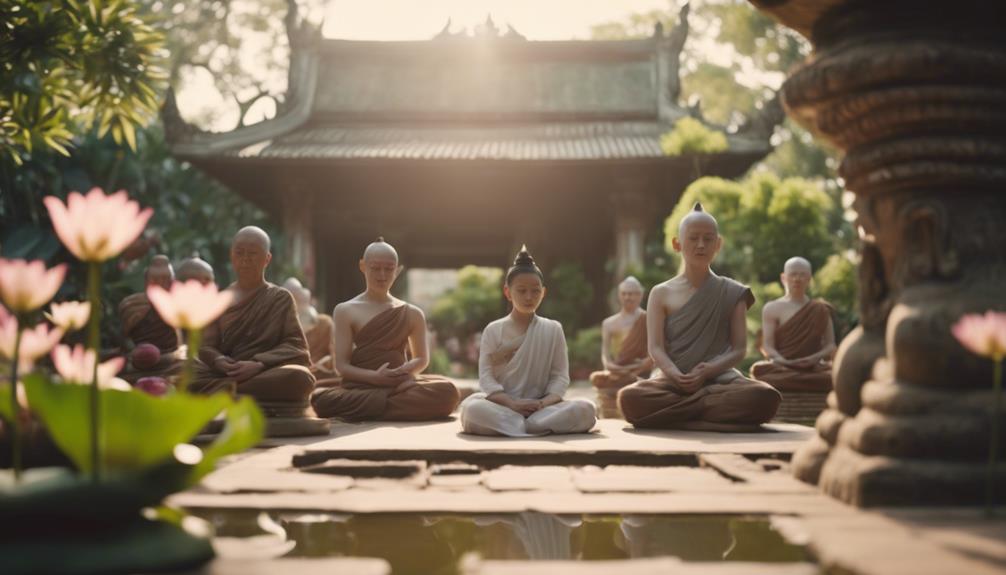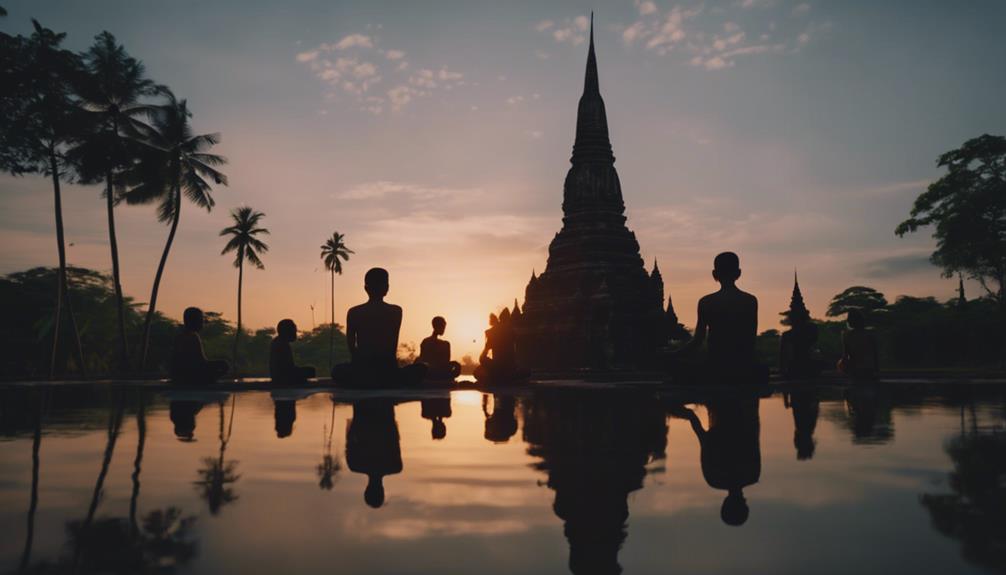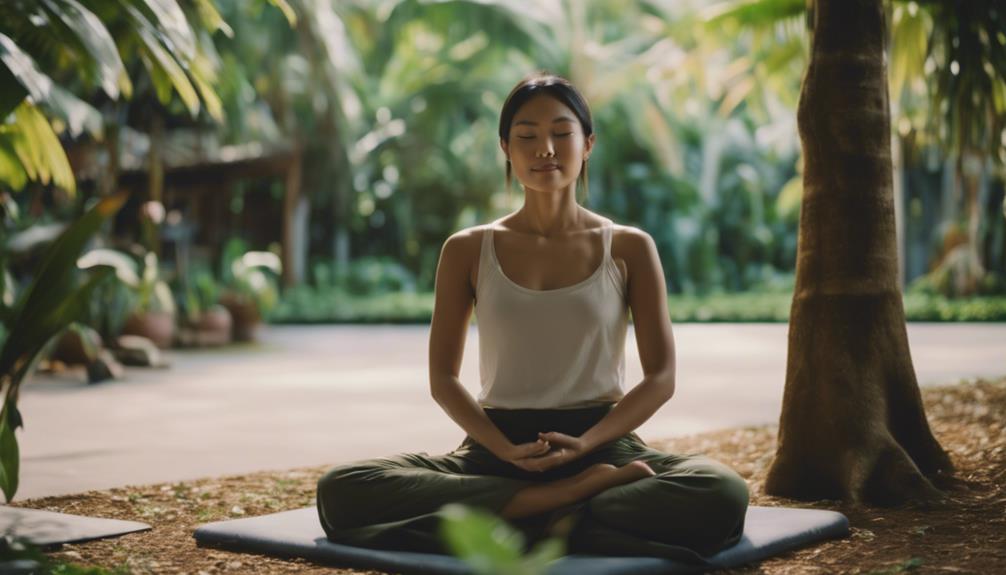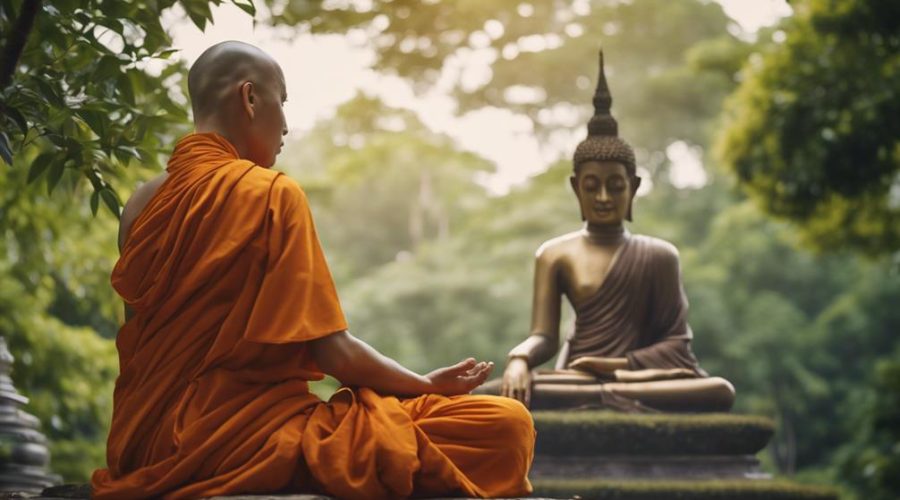Do People in Thailand Meditate?
Yes, many people in Thailand do meditate. It's an integral part of the Thai culture, influenced heavily by Buddhism. Thai meditation techniques, like Vipassana and Samatha, reflect a quest for spiritual growth and mental clarity. Meditation centers abound in Thailand, attracting locals and tourists seeking mindfulness and tranquility. You'll often see meditation woven into daily routines, fostering a mindful way of life. The practice has even shaped the Thai cuisine, promoting holistic well-being. By exploring further, you'll uncover more about the profound impact of meditation on the Thai lifestyle and its myriad benefits.
Key Takeaways
- Thai culture deeply integrates meditation into daily routines, reflecting their quest for spiritual growth.
- Buddhism heavily influences Thai lifestyle, including meditation practices like Vipassana and Anapanasati.
- Meditation centers in Thailand provide traditional techniques and immersive programs for locals and tourists.
- Thai meditation practices enhance mental clarity and emotional well-being, making it a common practice among Thais.
- Meditation tourism is popular in Thailand, showcasing its role in the country's cultural and spiritual landscape.
Understanding Thai Culture

To fully appreciate why meditation is so prevalent in Thailand, you'll need to explore the rich tapestry of Thai culture, marked by deep spiritual beliefs and unique traditions. Thai culture is a perfect blend of the spiritual and the earthly, deeply rooted in Buddhism, yet open to influences from the West.
The spiritual aspect of Thai culture manifests in its Thai language, which is peppered with Buddhist terminology, reflecting the deep-rooted influence of Buddhism on everyday life. The Thai language is an amalgamation of Pali and Sanskrit – the two ancient languages of Buddhism – reflecting the spiritual depth of its people.
Thai cuisine, on the other hand, represents the earthly aspect of Thai culture. It's an embodiment of the balance that Thais seek in life. The sweet, sour, spicy, and salty flavors of Thai cuisine symbolize the Buddhist principle of the Middle Path, a path of moderation. It's this balance that Thais bring to their practice of meditation.
In essence, the prevalence of meditation in Thailand isn't just a trend, but a reflection of the Thai people's quest for spiritual growth and balance in life. Understanding this cultural context may provide you with fresh insights into the practice of meditation in Thailand.
Origin of Meditation in Thailand
You'll find that the roots of Thai meditation lie in Buddhist practices, a reflection of the country's deep spiritual heritage.
It's also important to note the influence of Indian practices, which played a significant role in shaping Thai meditation.
Over time, these traditions evolved into the unique form of meditation we see in Thailand today.
Thai Buddhist Meditation Roots
Meditation in Thailand, deeply rooted in the traditions of Thai Buddhism, has a rich and complex history that dates back centuries. This practice hasn't only shaped the spiritual landscape of the country but also influenced the surge of meditation tourism.
Tourists from across the globe are drawn to Thailand's tranquility, seeking enlightenment through meditative practices. However, this comes with its own set of challenges, including instances of cultural affirmation. Non-Buddhists adopting Buddhist meditation practices without fully understanding their spiritual significance can lead to misinterpretations and misuses.
Influence of Indian Practices
While understanding the cultural significance of meditation in Thailand is essential, it's equally enlightening to ponder how Indian practices have greatly influenced the origins of Thai meditation. As you may know, Indian philosophy and the yoga influence play pivotal roles in shaping Thai meditation practices.
| Indian Philosophy | Influence on Thai Meditation | Example |
|---|---|---|
| Non-attachment | Central to Thai meditation | Letting go of desires helps achieve inner peace |
| Mindfulness | Adopted in Thai meditation | Present awareness of the mind and body |
| Yoga postures | Used in Thai meditation | Sitting cross-legged enhances focus |
| Control of breath | Integral to Thai meditation | Deep, slow breathing aids in relaxation |
| Karma | Belief in Thai meditation | Good actions result in positive outcomes |
Embracing the essence of these practices could pave the way for innovative approaches to mental wellness.
Evolution of Thai Meditation
Delving into the roots of Thai meditation, it's fascinating to see how it has evolved over centuries, deeply interwoven with Thailand's culture, traditions, and the influences from Indian practices. This evolution has greatly impacted meditation tourism, making Thailand a globally popular destination for seekers of tranquility.
With the introduction of meditation practices into daily life, Thailand has secured its position on the global stage. As meditation gains global popularity, it's interesting to observe how Thai meditation remains authentic while adapting to modern needs. The blend of tradition with innovation keeps it relevant and appealing.
In the evolution of Thai meditation, you see a dynamic process of growth, adaptation, and global influence, underpinned by centuries of spiritual and cultural practices.
Role of Buddhism in Thai Meditation
Buddhism plays a significant role in shaping Thai meditation practices.
As you explore Thai meditation techniques, you'll find they're deeply rooted in Theravada Buddhism, specifically the concept of mindfulness.
This influence underscores the importance of Buddhism in understanding and practicing Thai meditation.
Buddhism's Influence on Meditation
To grasp the significance of meditation in Thailand, you need to understand the deep-rooted influence of Buddhism in shaping this practice. Buddhism permeates every aspect of Thai life, its symbolism and teachings guiding not just religious rituals but also daily behaviors. This is no different when it comes to meditation.
However, there are misconceptions about meditation. It's not a passive act of sitting quietly but an active, mindful process. The Buddhist concept of mindfulness is central to Thai meditation, fostering a profound connection between mind, body, and universe. It's an innovative approach to personal growth, rooted in ancient wisdom. As you explore Thai meditation, appreciating this Buddhist influence can enrich your understanding and practice.
Thai Meditation Techniques
When you explore Thai meditation techniques, you'll quickly notice the profound role Buddhism plays in shaping these practices. It's not just about quieting the mind; it's a holistic approach influenced by centuries of Buddhist teachings.
- Meditation Tourism: As you explore, you'll discover that Thailand is a hotspot for meditation tourists. They flock here to immerse themselves in authentic Buddhist meditation practices.
- Thai Meditation Music: The traditional Thai meditation music, characterized by its calming and serene tunes, enhances the experience.
- Role of Buddhism: Buddhism saturates Thai meditation, from the monastic guided sessions to the mindfulness principles ingrained in the techniques.
This fusion of Buddhism and Thai traditions forms a unique meditation landscape that goes beyond relaxation. It's a journey of self-discovery and enlightenment, steeped in rich cultural heritage.
Theravada Buddhism and Mindfulness
Delving into the heart of Thai meditation, you'll find that Theravada Buddhism and its principles of mindfulness are the bedrock of these techniques. Theravada teachings stress the importance of personal enlightenment through self-discipline and meditation. In this practice, you're encouraged to immerse yourself in the present, fostering a deep awareness of your physical and mental experiences.
This mindfulness isn't just a passive state; it's an active engagement with the present moment. The mindfulness benefits are manifold, from enhanced mental clarity to reduced stress. By adopting these principles, you're not just gaining a meditation technique, you're embracing an innovative mindset.
This integration of ancient wisdom with contemporary needs makes Theravada Buddhism a dynamic force in Thai meditation.
Common Types of Thai Meditation
Have you ever wondered about the various types of meditation practiced in Thailand? There's a growing trend in meditation tourism, with people from all walks of life heading to Thailand to immerse themselves in deep spiritual practices. Thai Yoga, a unique combination of meditation and physical poses, is one of the most popular types.
Let's dive deeper into the common types of Thai meditation:
- Thai Yoga Meditation: This form blends traditional yoga postures with mindful meditation, fostering deep mental clarity and physical strength.
- Vipassana Meditation: A mindfulness technique that focuses on the deep interconnection between mind and body, realized through disciplined attention to the physical sensations.
- Metta Bhavana: Also known as Loving-Kindness meditation, it nurtures an attitude of love and kindness towards everything, even a person's enemies and sources of stress.
Each type offers unique benefits, shaping the way practitioners view themselves and the world around them. The choice often depends on personal preferences, individual beliefs, and the specific outcomes you're seeking. When you're ready to commence on your meditation journey, Thailand's rich spiritual landscape is waiting for you.
Meditation and Thai Lifestyle

Building on these meditation practices, it's evident how deeply rooted they're in the Thai lifestyle, shaping not only the individual's mindset but also their daily routines. When you look at Thai culture, you'll notice how meditation influences various aspects, from the food they eat, often referred to as 'Meditative Cuisine', to their thriving 'Meditation Tourism' industry.
Meditative Cuisine in Thailand isn't just about the food; it's a mindful way of eating, incorporating the principles of meditation into the culinary experience. It focuses on being present in the moment, appreciating the aroma, taste, and texture of the food while simultaneously nourishing the body and mind. It's a unique dining experience that promotes holistic well-being.
Meanwhile, Thailand's Meditation Tourism is an innovative concept that blends travel with the pursuit of inner peace. Tourists are drawn to Thailand not only for its natural beauty and cultural richness but also for the opportunity to learn and practice meditation in its traditional context. This trend has significantly impacted how tourism is perceived and conducted in Thailand, transforming it into an immersive, transformative experience rather than just sightseeing.
Meditation Centers in Thailand
Nestled in the heart of Thailand, you'll find a plethora of meditation centers that have become prominent hubs for locals and tourists alike in their quest for mindfulness and tranquility. These centers provide the perfect background for a spiritual retreat, offering a variety of practices that cater to different levels of expertise and preferences.
You may be wondering what makes these centers so unique. Here are a few distinctive features:
- Many centers incorporate traditional Thai techniques into their practices, appealing to those interested in experiencing meditation in its purest form.
- These centers often offer immersive programs that allow you to disconnect from your daily routine and fully focus on your spiritual journey.
- The rise in meditation tourism has prompted many centers to offer English-language courses, making them more accessible to international visitors.
Innovative approaches to meditation, coupled with Thailand's rich cultural heritage, make these centers a magnet for those seeking a unique spiritual retreat. They embody a perfect blend of traditional practices and modern conveniences, making them an essential part of the meditation landscape in Thailand. As you explore these centers, each visit promises to be a transformative experience, fostering a deeper understanding of mindfulness and tranquility.
Benefits of Thai Meditation Practices

Venturing into Thai meditation practices, you'll experience myriad benefits, from improved mental clarity and focus to enhanced emotional well-being. These practices don't just bring personal growth; they're also driving a new form of holiday experience: meditation tourism. As you initiate on this innovative journey, you'll find that these practices provide a unique blend of spiritual enrichment and mental health benefits.
The simple act of focusing on your breath, as done in many Thai meditation techniques, can alleviate stress, anxiety, and depression. The mindfulness cultivated can also foster greater self-awareness, helping you understand your emotional triggers better. These mental health benefits aren't abstract concepts; they're tangible outcomes backed by decades of scientific research.
Moreover, engaging in Thai meditation practices can elevate your cognitive function. Improved memory, better decision-making, and heightened creativity are just some of the perks you could enjoy. This cognitive boost is particularly beneficial in today's fast-paced, innovation-driven world, where mental agility is a prized asset.
In essence, Thai meditation practices offer you a holistic approach towards mental wellness and personal development, underpinned by age-old wisdom and modern science. So, whether you're seeking personal growth or an innovative holiday experience, these practices have much to offer.
Personal Experiences With Thai Meditation
When you engage in Thai meditation, personal experiences vary widely, yet many find a profound sense of inner peace and clarity that surpasses their initial expectations. You'll likely find yourself immersed in a world that revels in mindfulness, and you could be surprised by the transformative impact this practice has on your life.
In Thailand, meditation retreats are particularly popular, offering an intense, immersive experience for spiritual tourism. They typically involve:
- Guided mindfulness meditation sessions
- Dharma talks and teachings by experienced practitioners
- Opportunities for silent reflection and personal growth
These retreats are structured to help you navigate your inner landscape, bringing you closer to a state of tranquility and self-awareness. They aren't just vacations; they're a commitment to personal growth.
Furthermore, spiritual tourism in Thailand isn't limited to retreats. Many tourists visit temples, engage with monks, and participate in local meditation practices. This interaction with Thai culture and spirituality can further enrich your meditation experience.



